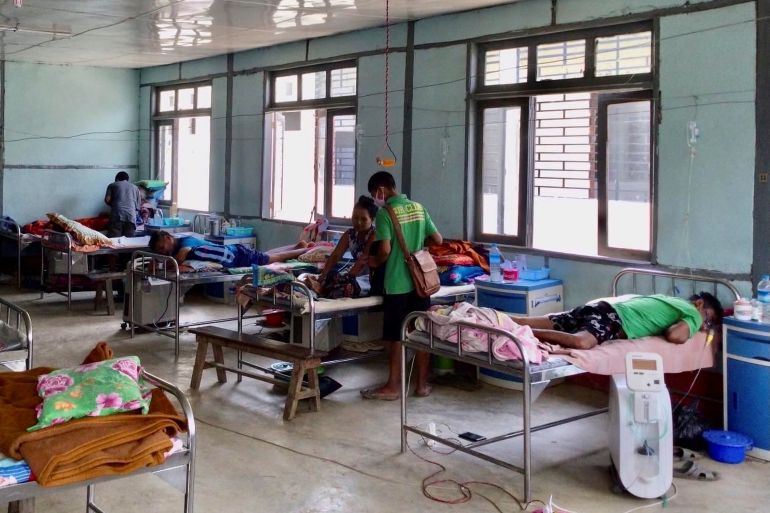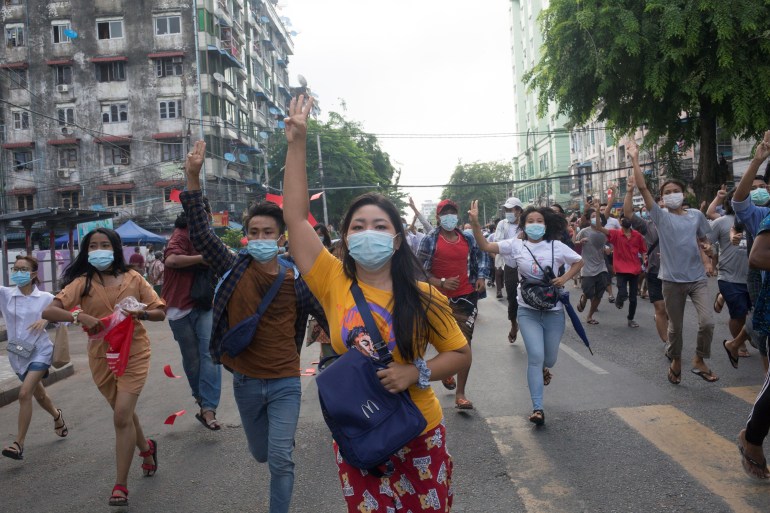Red Cross to provide emergency support to thousands in Myanmar
Aid organisation says 236,000 people in need of urgent assistance amid upheaval of COVID-19 and military coup.

The Myanmar Red Cross has said it was stepping up emergency support to hundreds of thousands of people in Myanmar affected by the COVID-19 pandemic and the upheaval resulting from the military coup on February 1.
The organisation, part of the International Federation of the Red Cross (IFRC), estimates about 236,000 people across Myanmar are facing worsening poverty and in urgent need of food relief and cash assistance, it said on Tuesday.
Keep reading
list of 4 itemsVillages empty, civilian armed groups rise in eastern Myanmar
Thailand concerned over violence in Myanmar
Several killed as Myanmar forces fight villagers in delta region
“Covid-19 has caused immense economic hardship across Myanmar in the past year,” Dr Htin Zaw Soe, Secretary-General of the Myanmar Red Cross Society said in a statement. “The current crisis has led to further social and economic upheaval. Many people are struggling to earn an income and have very limited access to basic services such as healthcare.”
Myanmar plunged into a political crisis four months ago when the military – under army chief Min Aung Hlaing – arrested the elected leaders of Aung San Suu Kyi’s government and seized power for themselves. Since then, thousands have taken to the streets in protest and a mass civil disobedience campaign has paralysed public services including healthcare and the military has used lethal force against protesters killing more than 850 people.
The Red Cross says the coup has exacerbated the economic problems caused by the COVID-19 pandemic, which had already led to the closure of shops and factories leaving thousands of people without jobs. Those living in makeshift settlements in the main cities were particularly vulnerable, it added.
“With a steady increase in humanitarian needs we are preparing for what could become a protracted crisis,” Joy Singhal, the IFRC’s Head of Delegation in Myanmar said in a statement. “This means scaling up both immediate and longer-term support while also factoring in the limited COVID-19 prevention efforts in the country.”

In the weeks after the coup the World Health Organization’s weekly coronavirus update showed cases of the disease dropping sharply to single digits even though there appeared to be no continuing effort to suppress the outbreak. In some border areas, ethnic armed groups that have long been fighting the military, have stepped in to organise their own COVID-19 response.
The Myanmar Red Cross said more than 2,000 of its first aid volunteers had “played a critical role on the front lines of the current crisis, providing lifesaving first aid, healthcare and ambulance services, in line with their fundamental humanitarian principles of independence, neutrality and impartiality, to individuals injured and/or ill including pregnant women for safe delivery of babies.”
Medics operating on the front lines of the protests have often found themselves attacked by the military.
The aid organisation, the largest in Myanmar, warned the impending monsoon could create more difficulties for people in Myanmar especially for those in low-lying coastal regions.
Four of the five most vulnerable regions during the monsoon – Ayeyarwady, Bago, Tanintharyi and Mon – have also been badly affected by the current civil unrest, the Red Cross said.
In anticipation of any deterioration, it said it was pre-positioning stocks of key relief items including equipment for emergency shelters and water purification units.